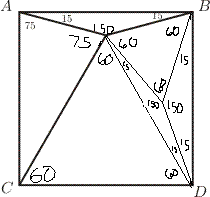 I helped my daughter keep from failing her ninth grade geometry class, but in the process probably destroyed any interest she might have had in the subject (and math in general) and gave her no working geometry skills she could carry forward into life or any further math studies that would build on that geometry knowledge. It is a small case study in “teaching to the test”, or in this case helping Emma complete homework and stumble by with C’s and D’s on her math tests.
I helped my daughter keep from failing her ninth grade geometry class, but in the process probably destroyed any interest she might have had in the subject (and math in general) and gave her no working geometry skills she could carry forward into life or any further math studies that would build on that geometry knowledge. It is a small case study in “teaching to the test”, or in this case helping Emma complete homework and stumble by with C’s and D’s on her math tests.
As always, the context is important. This was Emma’s first year in high school, and it turned out to be her last year of formal education. Her other classes – English, French, History, Body Contouring (physical education), and Art & Ideas – dealt with topics of interest to her and were not a particular issue (see “Back to School Night” for more about my encounter with some of her teachers). But math was not something that Emma showed an interest in, particularly a more abstract sort of math like geometry.
I on the other hand have always had a real aptitude for math and enjoyed the arcane, abstract subject matter and methodologies. Besides high school math, I took three semesters of calculus in college, along with linear algebra, statistics, logic and set theory classes, which were requirements for my degree in computer science. (Subsequently I got involved in the business side of computer information technology and never really used any of my math, except maybe some of the set theory.) So when my daughter came to me after failing her first ninth grade math test, I happily agreed to tutor her. I thought I was helping her learn math, but turns out I was only helping her pass math.
Emma’s geometry class was taught by jaded, even burnt-out, veteran math teacher, who was faced with a classroom of thirty plus kids, the overwhelming majority of which, according to my daughter, did not want to be there. Over half the class was straight out failing, and most of the rest, like my daughter, were struggling to barely pass. After meeting her teacher on back-to-school night, I felt for him and his personal hell of facing a classroom full of teenagers each day who hated the subject he was teaching and mostly failing or in danger of doing so.
 So pretty much every school night we spent an hour working on her math homework or her test review problems. Her geometry course work boiled down to learning algorithms to solve various types of problems calculating angles, segment lengths and areas, and then learning which algorithm to apply in what circumstance. Emma had no interest in this stuff as an abstract exploration, and I really could not give her any examples of how she would use this knowledge in her life, particularly since she had no interest in math or science as a vocation or avocation. So it was a challenge to keep her head in it, since her only motivation is she did not want to fail.
So pretty much every school night we spent an hour working on her math homework or her test review problems. Her geometry course work boiled down to learning algorithms to solve various types of problems calculating angles, segment lengths and areas, and then learning which algorithm to apply in what circumstance. Emma had no interest in this stuff as an abstract exploration, and I really could not give her any examples of how she would use this knowledge in her life, particularly since she had no interest in math or science as a vocation or avocation. So it was a challenge to keep her head in it, since her only motivation is she did not want to fail.
So each night we would work through the homework problems. I would try my best to explain the concepts if she had not understood them when they were explained by her teacher in class. Like a physical trainer or coach, I would push her to do her “reps” of homework problems assigned to her. Most every school day she would turn in completed homework, which counted toward a significant portion of her final grade. In theory, with all her homework turned in, she could bet a passing “C” in the class even if she had only a high “D” average on her tests.
That in itself is an interesting conundrum – turning in homework can substitute for demonstrating knowledge of the subject matter. This gave kids a distinct advantage if their parents understood geometry and had time to work with them and “help them” with (which in some cases included doing at least some of) their homework problems. This way the particularly well to do families, with their own good educational backgrounds, could get a leg up on the other kids from poorer families where the parents had either available time or less knowledge of geometry, a knowledge area you generally only learn in school, rather than in real life.
I assume the teacher’s strategy was that grading the homework would encourage (coerce) the kids to actually do it, and would give them at least a chance of increasing their understanding of the concepts and passing the tests. I know in my daughter’s history class, because most of the kids were doing so poorly on the tests, her teacher nixed potentially interesting class discussions about the topics read in the history text in favor of spending class time actually outlining the assigned pages from that text. This was mind-numbingly boring for my daughter (and I’m sure the others), but it was a last ditch attempt to try to get the kids to “osmose” the material somehow and not fail the tests. (Can you sense through my written words the irony I feel as I write all this?)
As it turned out, focusing the recipient of my tutoring on doing all the homework problems was the strategy I adopted. At least if she failed to understand, she would get points for turning in the homework. Then when it came to the test review problems, I would build her a one-page summary of all the algorithms that would be applicable for the next day’s test, a sort of “cheat sheet” that I suggested she (legally) review prior to starting the test to hopefully keep some semblance of all those algorithms actively available in her brain. This strategy was successful, at least to the extent that she would get either C’s or D’s on her tests.
You could characterize the strategy, in a larger context of actual learning, as being much less successful. As alternative education advocate John Holt once wrote, “The good students forget the material after the test, not before.” As we went through the semester and I pestered my daughter to sit down with me and do her hour of geometry each night, she got more and more frustrated at having to spend so much of her time doing something that she was not interested in, and which was becoming more onerous as the class went on.
In most math classes, each new topic or chapter builds on the previous one, and if truly successful, the student develops a hierarchy of more advanced knowledge on the basic building blocks. Given that, if you barely understand the building blocks, synthesizing that tenuous knowledge for more advanced topics gets increasingly frustrating and problematic.
By the second semester, Emma increasingly dreaded our sessions and I found it harder and harder to convince her to devote that painful hour to the effort. I suspect she got through and got her C minus in the class by promising herself, “I will never do this again!” And as I write this, four years later, she has gone nowhere remotely near anything having to do with math.
So what if I had spent the maybe 150 hours I spent with her passing math actually exploring some area of math she might have been interested in? She was interested in design in general and computer game design in particular. One of the on-line computer game worlds she was involved in helping develop gave her and other developers the ability to construct houses and other buildings using basic three dimensional modeling techniques. What if I had spent those 150 hours helping her learn how to do basic 3D modeling and develop a skill that she would actually find useful? It would not have helped her pass that geometry class, but it might have given her a real sense of working with geometric “space” and maybe at some later date, given some of the concepts introduced in her geometry class some meaning.
So much for trying to learn something abstract out of context! I think that trying to learn skills out of context is one of the basic weaknesses of our current conventional instructional school model. The teacher should come when the student is ready. Ideally, the student seeks instruction when the need or desire arises to pursue a particular path of learning and the student needs the material the teacher can convey to keep moving forward.
Hi Coop,
Just read your ‘Tutoring Geometry” segment. You write thoughtfully and convincingly. Keep on!
reuben